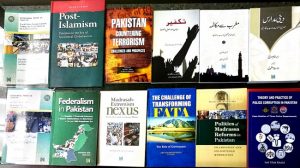 The Iqbal International Institute for Research and Dialogue (IRD) of the International Islamic University, Islamabad (IIUI) published as many as 10 books in 2017.
The Iqbal International Institute for Research and Dialogue (IRD) of the International Islamic University, Islamabad (IIUI) published as many as 10 books in 2017.
According to report released by Institute, it organized various national and international events in which leading scholars from Pakistan and abroad presented their views on matters related with the contemporary Islamic Thought, human rights, law, pluralism, tolerance, democracy, Islam and the west, Inter-faith dialogue and Islamic Response and actions viz-a-viz religious extremism and violence.
The report says Following books were published by IRD: Takfir; Asbab Aur Usool-o-Zawabit: Pakistani Society in particular and the Muslim World in general is in grip of severe attack of Takfir i.e naming others with blasphemy or Kufr. Dr.Ahmad Bin Yousif Al-Draiweesh, President International Islamic University, Islamabad has seen this topic in light of the Quran and Sunnah and argued that individuals have no right to name others with Kufr or any other abusive word.
Maghrib Say Mukalima, Unfortunately Islam has been depicted as an eastern religion whereas it is universal. Keeping in view present nomenclatures of the East-West division, the book speaks about Islam and its message for West. Dr. Husmul Amin in this edited book presented papers of leading scholars of Pakistan.
Post-Islamism: Pakistan in the Era of Neoliberal Globalization: Globalization has its pros and cons. The Muslim world is also witnessing impacts of this phanomena. Dr. Husnul Amin in this book has viewed impacts of globalization in Post-Islamism Era.
Deeni Madaris; Asri Maanviat Aur Jadeed Taqazay, This is an Urdu translation of “What is Madrassah”? , by Dr. Ibrahim Moosa, a renowned US based scholar of Indian Subcontinent origin. Dr. Moosa as a student remained at Deoband and Lucknow in India. He saw culture of Madrassahs of India and Pakistan in detail. He suggested some valuable additions in Madrassah curriculum.
Pakistan; Countering Terrorism-Challenges and Prospects, This is an edited book by Dr. Husnul Amin and Dr. Maryam Siddiqa. This book has seen Pakistan in perspective of countering terrorism with a special emphasis on challenges and prospects. The book also speaks about sectarian and terrorist ideologies, networks and organizations.
Theory and Practice of Police Corruption in Pakistan, This book written by Saif-ullah Khalidsees police corruption in Pakistan as a sociological issue. Mr. Saif-ullah Khalid has focus on police departments of Islamabad, Rawalpindi city and Khyber Pakhtunkhwa.
Politics of Madrassa Reforms in Pakistan; Islamization And Enlightened Moderation by Dr. Maryam Siddiqa &Madrasah-Extremism-Nexus; Text, context and Contemporary debates by Muhammad Rashid, These two books like one that of Dr. Ibrahim Moosa also focus on various aspects of Madrassahs. Dr. Maryam Siddiqa has seen Madrassahs passing through reforms in Pakistan and emergence of enlightened moderation. Muhammad Rashid spoke on nexus between Madrassah and extremism especially with an emphasis on text, context and contemporary debates.
Federalism in Pakistan; The Question of Provincial Autonomy in Khyber-Pakhtunkhwa and Balochistan in the post 18th Amendment Era by Muhammad Ozair and Irfan Khan &The Challenge of Transforming FATA; the Role of Governance by Arif Mahmood Khan, In “Federalism in Pakistan” the authors have shed light on deprivation of Balochistan and Khyber Pakhtunkhwa in its historical perspective. They also spoke on these two provinces in the back drop of 18th amendment in the constitution of Pakistan. “The challenge of transforming FATA” is contribution to bring these neglected areas in to mainstream. The role of governance is special concern of these areas as deliberated by the author Arif Mahmood Khan, a retired Pakistan Army officer. The institute also published papers including Local Cities, Foreign Capitals: Finding the Local Anchor in the Global Cultures: The Dimensions and Phases of Globalization: An Islamic Perspective by Dr. Muhammad Khalid Masud and Sir Syed in Post-Colonial Perspective: where is Sir Syed in Post-Colonial Socio-c Cultural situation? by Dr. Syed Jafar Ahmad.

